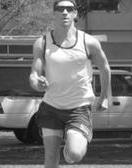I thought I would do a post on this as I am currently in this position. Without going into too much detail, I have something wrong with my hand, pretty much think its a bit of a strained tendon, have no idea how on earth I did it, but its not 'painful', just uncomfortable. So I have stopped working out, been a week now, and I think it will be another week or two. Does that mean I have to stop all exercise? no. I have decided to switch training styles and aim at fat burning exercises (ones which don't require me to use my right hand!) and a bit of endurance work.
Injuries are part of working out, and at some point you will pick one up, whether it be minor or major. But that doesn't mean you have to stop working out altogether. The only time that you should, is if you pick up an injury that is bad, such as a spinal injury, which would obviously stop you doing pretty much anything! But, if you pick up a calf injury for example, you can still train your core and upper body, as long as your not putting pressure on your calf. If you pick up a bicep injury, then concentrate on core and legs while your bicep recovers. I have read a few studies which say training other body parts when having an injury can speed up the recovery process of the injured muscle. Whether that is 100% accurate, I don't know, but as long as you're not putting pressure on the injured muscle, then you can still work out. Many people take a negative attitude when it comes to injuries, and think they cannot do anything and take up the 'ahh I'm injured, can't work out!' mentality, But, they actually can.
A common thing with guys, is that they want to be big and muscular, and they often neglect body fat. They tend to be a good size and have good strength, but they never look that 'great' because of the higher body fat, so being injured (as long as its not a major one, and preferebly an upper body injury) you can concentrate on fat burning exercises. Even though its not the best form of fat burning, going for runs (can add in sprints) bike rides (cross country is great) and bodyweight circuits, will burn up fat, and lower your body fat. That is what I am personally doing right now, knowing there is limited things I can do, I am resorting to other forms of exercise, ones that wouldn't be my first choice, but end of the day they are still burning up calories and fat, which will lower my BFP.
So, be smart, don't take an injury as a full on negative (unless it is a severe one) and train other parts of your body while your injured part recovers.

